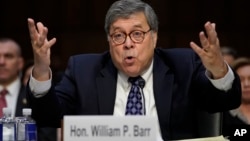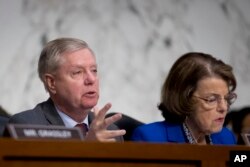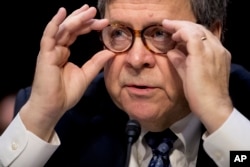U.S. President Donald Trump's pick for attorney general, William Barr, goes before the Senate Judiciary Committee again Wednesday, after pledging in his first day of confirmation hearings to shield the special counsel's Russia probe from political pressure.
In his initial appearance before the panel, Barr also took issue with Trump's labeling the investigation of his inner circle's contacts with Moscow as a "witch hunt."
"I don't believe (special counsel Robert) Mueller would be involved in a witch hunt," Barr said, adding that he intends to let the probe run its course and that the results should be made known to the public and Congress.
Barr said the special counsel could only be terminated for good cause and that "it's unimaginable" that Mueller would "ever do anything that gave rise to good cause."
Democrats repeatedly stressed the importance of independence to the role of attorney general and noted Trump's penchant for lashing out at the Justice Department.
"I believe it is important that the next attorney general be able to strongly resist pressure, whether from the administration or Congress," California Democrat Dianne Feinstein said. "He must have the integrity, the strength and the fortitude to tell the president 'no' regardless of the consequences."
"If confirmed, the president is going to expect you to his bidding. I can almost guarantee he'll cross the line at some point," Vermont Sen. Patrick Leahy said.
"I can truly be independent," Barr insisted. "I'm in a position in life where I can do the right thing and not really care about the consequences ... I will not be bullied into doing anything I think is wrong."
Barr's memo
Barr, who served as attorney general under President George H. W. Bush, has drawn scrutiny for a memo he wrote last year criticizing special counsel Mueller for examining whether Trump tried to obstruct the investigation by firing then-FBI Director James Comey in 2017.
In a memo to Deputy Attorney General Rod Rosenstein, who oversees the Russia investigation, Barr opined that probing Trump's actions toward Comey was "fatally misconceived" and "grossly irresponsible."
The memo, written last June, came to light after Trump nominated Barr, 68, to succeed then-Attorney General Jeff Sessions, whom Trump ousted over his recusal from oversight of the Russia investigation. The document sparked widespread concern among minority Democrats in the Senate, who have long feared Trump intends to shut down the probe.
At the confirmation hearing, Barr argued his memo was "narrow in scope" and did not address the investigation into Russian interference in the 2016 election and other "potential obstruction-of-justice theories."
Later in the hearing, Barr said, "I think Russians attempted to interfere with the [2016] election, and I think we have to get to the bottom of it."
Republicans also sought assurances from the nominee. The committee's new chairman, Lindsey Graham of South Carolina, expressed outrage over extensive communications between two FBI agents during the 2016 presidential campaign that showed extreme bias and prejudice against Trump.
"We're relying on you to clean this place up," Graham said of the Justice Department.
Graham also asked if, as commander in chief, Trump has the authority to divert federal funding in order to build a wall along the U.S.-Mexico border.
"Without looking at the statute, I really couldn't answer that," Barr replied.
The nominee criticized so-called "sanctuary cities" that do not notify federal officials about undocumented immigrants who are taken into custody. He also weighed in on the current standoff between the White House and congressional Democrats over border wall funding.
"I would like to see a deal reached whereby Congress recognizes that it's imperative to have border security, and that part of that border security, as a commonsense matter, needs barriers," Barr said.
Masood Farivar and Wayne Lee contributed to this report.







